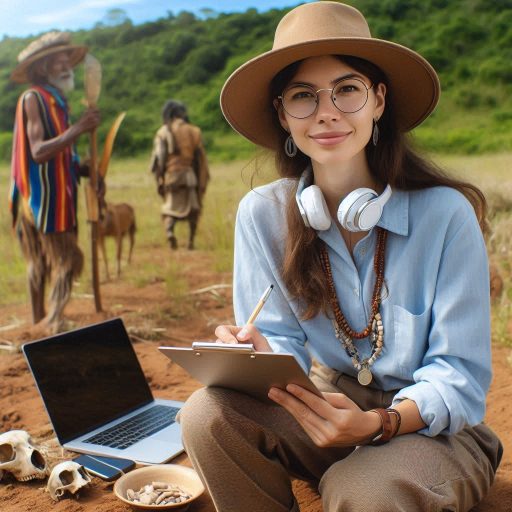Introduction
Anthropology is the study of humans, their cultures, and their development.
It examines societies, languages, and behaviors across time and space.
Anthropologists play a vital role in understanding the complexities of human life.
They help bridge cultural gaps and promote understanding among diverse groups.
Their work informs public policy, education, and social justice initiatives.
Anthropologists study various aspects of humanity, including beliefs, practices, and social structures.
They conduct research that sheds light on contemporary issues, such as globalization and migration.
By analyzing cultures, anthropologists provide valuable insights into human behavior and social dynamics.
Pursuing a career in anthropology offers numerous benefits.
It allows you to explore diverse cultures and contribute to meaningful change.
Anthropologists often work in various sectors, including academia, non-profits, and government agencies.
They gain skills in research, critical thinking, and communication, which are applicable in many fields.
Moreover, a career in anthropology can be personally fulfilling.
You can make a difference by advocating for marginalized communities and promoting cultural awareness.
Embracing anthropology means committing to a lifelong journey of learning and understanding humanity.
Research Anthropology
To become a professional anthropologist, start by understanding the different fields of anthropology.
Anthropology is broadly divided into four main fields: biological, cultural, linguistic, and archaeological.
Each field focuses on unique aspects of human existence and society.
Different Fields of Anthropology
Biological Anthropology
Biological anthropology studies human evolution, genetics, and physical diversity.
This field examines the biological aspects of humans, including adaptation to environments.
Biological anthropologists often conduct fieldwork, analyzing fossils and living populations.
They also study primatology, examining our closest relatives.
Cultural Anthropology
The Cultural anthropology focuses on the social and cultural aspects of human life.
Cultural anthropologists study customs, beliefs, and practices within different societies.
They often engage in ethnographic research, immersing themselves in communities to gain insight.
Cultural anthropologists analyze how culture shapes human behavior and social structures.
Linguistic Anthropology
Linguistic anthropology explores the relationship between language and culture.
This field examines how language influences social life and identity.
Linguistic anthropologists study dialects, communication styles, and language evolution.
They often conduct interviews and analyze texts to understand cultural meanings.
Archaeological Anthropology
Archaeological anthropology investigates past human societies through material remains.
Archaeologists excavate sites to uncover artifacts, structures, and other cultural materials.
They analyze these findings to reconstruct historical contexts and understand past human behavior.
Archaeological fieldwork often requires physical endurance and attention to detail.
Role of an Anthropologist in Each Field
In each field, anthropologists play distinct roles.
Biological anthropologists analyze human biological diversity and evolution.
Cultural anthropologists explore and interpret cultural practices and beliefs.
Linguistic anthropologists examine how language shapes interactions and identity.
Archaeologists reconstruct past societies based on material evidence.
Skills and Knowledge Required to Excel in Research Anthropology
Regardless of the field, several skills and knowledge areas are essential for research anthropology.
Strong research skills are fundamental, as anthropologists must collect and analyze data.
Critical thinking enables them to interpret findings and draw meaningful conclusions.
Excellent communication skills allow anthropologists to present their research effectively to diverse audiences.
Additionally, cultural sensitivity and ethical awareness are crucial for conducting research responsibly.
Anthropologists must navigate complex social dynamics and respect the communities they study.
Adaptability is also important, as anthropologists often work in diverse environments and face unexpected challenges.
Finally, a solid educational foundation in anthropology is vital.
Pursuing a bachelor‘s degree in anthropology provides essential knowledge about human cultures and societies.
Many anthropologists also pursue advanced degrees to specialize in their chosen field, deepening their expertise.
Understanding the different fields of anthropology and developing the necessary skills is critical for aspiring anthropologists.
By focusing on research and cultivating these abilities, you can build a successful career in this fascinating field.
Read: How Climate Change Is Impacting Plant Research
Education Requirements
To become a professional anthropologist, follow a structured educational path.
This journey typically includes obtaining a bachelor‘s degree, a master‘s degree, and, often, a Ph.D.
Each step builds essential skills and knowledge in anthropology.
Typical Educational Path to Becoming an Anthropologist (Bachelor’s, Master’s, Ph.D.)
Bachelor‘s Degree
Start with a bachelor‘s degree in anthropology or a related field.
This foundational degree introduces you to core concepts in anthropology.
You will learn about cultural, biological, linguistic, and archaeological anthropology.
Engage in courses that emphasize research methods and critical thinking.
Participating in fieldwork or community projects can enhance your understanding and experience.
Master‘s Degree
After earning your bachelor‘s degree, consider pursuing a master‘s degree in anthropology.
This advanced degree allows for specialization in a particular field, such as cultural or biological anthropology.
You will engage in more in-depth research and develop your analytical skills.
Many master‘s programs require a thesis or capstone project that demonstrates your research abilities.
Completing this degree often enhances your career prospects.
Ph.D. Degree
A Ph.D. is typically required for academic positions and advanced research roles.
This terminal degree involves extensive research, fieldwork, and a dissertation.
Your dissertation should contribute original knowledge to the field of anthropology.
Completing a Ph.D. demonstrates your expertise and commitment to research.
It also opens opportunities for teaching at universities and leading research projects.
Importance of Internships and Fieldwork Experience
Internships and fieldwork experience are crucial for becoming a successful anthropologist.
These experiences provide hands-on learning and real-world applications of classroom knowledge.
They allow you to apply research methods and engage with diverse communities.
Fieldwork experiences can enhance your cultural sensitivity and adaptability.
Additionally, internships often help you build professional networks within the field.
Many graduate programs offer opportunities for internships or fieldwork as part of the curriculum.
Seek out positions that align with your career goals and interests.
Gaining practical experience in various settings strengthens your resume and prepares you for future roles.
Potential Scholarships and Grants for Anthropology Students
Several scholarships and grants are available for anthropology students.
These financial resources can ease the burden of tuition and living expenses.
Research university-specific scholarships or external organizations that support anthropology education.
Some organizations, such as the American Anthropological Association, offer funding for students pursuing anthropological research.
Additionally, many universities provide research grants for graduate students.
These grants support independent research projects or fieldwork.
Applying for scholarships and grants can significantly impact your educational journey.
A structured educational path is vital for aspiring anthropologists.
Earning a bachelor‘s degree, followed by a master‘s and Ph.D., lays a strong foundation.
Internships and fieldwork experience enhance your learning and skills.
Seeking scholarships and grants can further support your educational goals.
By following this path, you can build a successful career in anthropology.
Read: Exploring the Different Branches of Geology
Specialize in a Subfield
Specializing in a subfield of anthropology can enhance your career prospects.
It allows you to focus on specific interests and expertise.
This targeted approach can make you more competitive in the job market.
Employers often seek candidates with specialized knowledge and skills.
A specialization helps you build a robust professional identity.
Benefits of Specializing
Specializing offers several advantages.
First, it enables you to gain in-depth knowledge in a specific area.
This depth of understanding can improve your research quality and analysis.
Second, it allows you to network with professionals in that subfield.
Building connections with peers and experts can lead to job opportunities.
Finally, specialization can increase your job satisfaction.
When you pursue your interests, you are more likely to enjoy your work.
Various Subfields Available
Anthropology comprises various subfields, each with unique focus areas.
Forensic anthropology applies anthropological methods to legal contexts.
Forensic anthropologists analyze skeletal remains to determine identity and cause of death.
Medical anthropology studies health and illness through cultural and social lenses.
Medical anthropologists examine how cultural practices impact health outcomes.
Cultural anthropology focuses on understanding cultural practices and beliefs across societies.
Archaeological anthropology investigates past human societies through material remains.
Each subfield requires specific skills and knowledge.
Choosing a Subfield
Choosing a subfield that aligns with your interests and career goals is crucial.
Start by exploring different subfields during your education.
Attend lectures, workshops, or seminars on various topics.
Engage with professionals working in each subfield to gain insights.
Consider your passions and what aspects of anthropology excite you most.
Reflect on the type of work environment you prefer.
Do you enjoy fieldwork, lab research, or community engagement?
Transform Your Career Today
Unlock a personalized career strategy that drives real results. Get tailored advice and a roadmap designed just for you.
Start NowConduct informational interviews with professionals in your areas of interest.
This approach provides valuable perspectives on daily responsibilities and challenges.
Shadowing a professional in your desired subfield can also offer firsthand experience.
Additionally, research job prospects in each subfield.
Understanding the demand for specific roles can guide your decision.
Consider pursuing internships in different subfields.
This hands-on experience can help you evaluate your interests.
Internships also provide networking opportunities, essential for entering your chosen field.
Specializing in a subfield of anthropology offers numerous benefits.
It enhances your expertise, job prospects, and overall career satisfaction.
Explore various subfields like forensic or medical anthropology to find your fit.
Use your education, internships, and networking to make an informed choice.
By specializing, you can build a successful and fulfilling career in anthropology.
Read: Top Skills Needed for a Successful Geology Career
Gain Fieldwork Experience
Fieldwork is essential in anthropology.
It allows anthropologists to collect firsthand data and observe cultures in real-world settings.
This experience enriches your understanding of human behavior and cultural practices.
Engaging directly with communities provides deeper insights than classroom learning alone.
Fieldwork helps you develop critical research skills, such as data collection and analysis.
Significance of Fieldwork
Fieldwork enhances the validity of anthropological research.
It enables you to witness cultural dynamics and social interactions.
This direct observation leads to more accurate interpretations of behaviors and beliefs.
Additionally, fieldwork fosters relationships with community members.
Building trust with participants can lead to richer data and collaborative research efforts.
Overall, fieldwork is vital for applying anthropological theories to real-life situations.
Challenges and Rewards of Conducting Fieldwork
Conducting fieldwork presents various challenges.
First, you may face language barriers when working in diverse communities.
Miscommunication can hinder data collection and relationship-building.
Second, cultural differences can pose challenges.
Understanding local customs and norms requires adaptability and sensitivity.
Third, fieldwork can be physically demanding and emotionally taxing.
Long hours and exposure to unfamiliar environments can be overwhelming.
Despite these challenges, fieldwork offers significant rewards.
You gain invaluable skills in data collection and analysis.
Additionally, the personal connections formed during fieldwork are often profound.
These relationships can lead to lifelong friendships and professional networks.
Moreover, successful fieldwork can contribute to meaningful social change.
Your research may impact the communities you study positively.
How to Secure Fieldwork Opportunities
Securing fieldwork opportunities requires proactive steps.
Start by researching organizations and projects that align with your interests.
Academic institutions often have fieldwork programs available for students.
Reach out to professors for recommendations on potential fieldwork sites.
They may have connections with organizations conducting relevant research.
Networking at conferences can also provide valuable contacts in the field.
Consider volunteering with organizations that engage in anthropological work.
Volunteering offers practical experience while helping you build your resume.
Additionally, internships may provide opportunities for fieldwork.
Many anthropology programs incorporate internships as part of their curriculum.
Create a strong application when applying for fieldwork positions.
Highlight your skills, interests, and any relevant experience in your resume.
Tailor your cover letter to reflect your enthusiasm for the project.
Demonstrating your commitment and passion can set you apart from other candidates.
Gaining fieldwork experience is crucial for aspiring anthropologists.
It deepens your understanding of cultural practices and enhances your research skills.
While challenges exist, the rewards of fieldwork are immense.
By actively seeking opportunities and networking, you can secure valuable fieldwork experiences that shape your anthropological career.
Read: The Future of Botany: Emerging Fields and Innovations

Develop Strong Research Skills
Research skills are vital in anthropology.
They enable you to gather, analyze, and interpret data effectively.
Strong research skills lead to credible findings and insightful conclusions.
Anthropologists rely on these skills to understand complex cultural dynamics.
Well-developed research skills enhance the overall quality of your work.
Importance of Research Skills in Anthropology
In anthropology, research skills help you explore diverse cultures and societies.
These skills facilitate thorough investigations into human behavior and beliefs.
Strong research abilities allow you to ask meaningful questions and develop hypotheses.
Additionally, they empower you to design effective studies and choose appropriate methodologies.
Overall, research skills contribute to the rigor and reliability of your work.
Tips for Conducting Effective Research
Conducting effective research requires careful planning and execution.
First, define your research question clearly.
A focused question guides your study and informs your methodology.
Second, choose appropriate research methods based on your objectives.
Methods may include surveys, interviews, or participant observation.
Selecting the right approach ensures you collect relevant data.
Third, ensure ethical considerations are a priority.
Obtain informed consent from participants and respect their privacy.
Ethical research practices build trust and credibility with communities.
Fourth, maintain detailed field notes throughout your research.
These notes help you remember crucial details and observations.
Organizing your data efficiently can streamline your analysis process.
Additionally, stay adaptable during your research.
Unexpected challenges may arise, requiring you to modify your approach.
Be open to adjusting your research methods based on evolving circumstances.
Finally, engage in continuous reflection throughout your research.
Regularly assess your progress and adapt your strategies as necessary.
Resources for Improving Research Skills
Improving your research skills involves utilizing various resources.
Academic journals are an excellent starting point for understanding current research trends.
Journals like American Anthropologist and Cultural Anthropology publish cutting-edge studies.
Reading these articles helps you learn about new methodologies and theoretical frameworks.
Conferences also provide valuable opportunities for skill development.
Attending anthropological conferences allows you to network with professionals and gain insights.
Participate in workshops focused on research techniques and methodologies.
These hands-on sessions can enhance your practical skills.
Online courses and webinars can further improve your research skills.
Many universities and organizations offer free or low-cost resources.
Explore platforms like Coursera, edX, or FutureLearn for relevant courses.
These resources cover various research methods, data analysis techniques, and ethical considerations.
Developing strong research skills is essential for aspiring anthropologists.
These skills enable you to conduct thorough investigations and contribute valuable insights.
By following effective research practices and utilizing available resources, you can enhance your research abilities.
Embrace continuous learning to become a more skilled and effective anthropologist.
Find Out More: Top Industries Hiring Materials Scientists Today
See Related Content: Seismology and Public Safety: Community Impact
Build a Professional Network
Networking is crucial in the field of anthropology.
It opens doors to various career opportunities and collaborations.
A strong professional network can enhance your knowledge and provide support.
Building relationships with professionals helps you stay informed about industry trends.
Networking also increases your visibility within the anthropology community.
Benefits of Networking in Anthropology
Networking offers numerous benefits for aspiring anthropologists.
First, it allows you to connect with experienced professionals.
These connections can provide mentorship and guidance throughout your career.
Second, networking helps you learn about job opportunities and research projects.
Many positions are filled through referrals, making connections invaluable.
Third, networking fosters collaboration among anthropologists.
Working together on projects can lead to innovative research and valuable insights.
Fourth, it exposes you to diverse perspectives and approaches in anthropology.
Engaging with others enhances your understanding of different subfields.
Tips on How to Build a Professional Network
Building a professional network requires proactive steps.
First, attend conferences related to anthropology.
Conferences provide excellent opportunities to meet professionals and engage in discussions.
Participate in workshops and panel sessions to enhance your knowledge.
Make sure to introduce yourself to speakers and attendees.
Second, join professional organizations such as the American Anthropological Association (AAA).
These organizations offer resources, networking events, and forums for members.
Becoming involved in committees or working groups can increase your visibility.
Additionally, volunteer for events to meet more professionals in the field.
Third, utilize social media platforms to connect with others.
LinkedIn and Twitter are popular among professionals in anthropology.
Share your research and insights to engage with your network.
Follow influential anthropologists and organizations to stay updated on trends.
Fourth, reach out to alumni from your educational institutions.
They can provide insights into their career paths and share valuable connections.
Attend alumni events to expand your network further.
Potential Career Opportunities from Networking
Networking can lead to various career opportunities in anthropology.
First, it may help you secure internships or job placements.
Many organizations prefer hiring candidates with personal recommendations.
Second, networking can facilitate collaborations on research projects.
Partnering with established professionals can enhance your research profile.
Third, your network can provide access to exclusive conferences and workshops.
These opportunities may lead to new insights and skills.
Finally, a strong network can guide you toward diverse career paths.
Anthropology graduates can work in academia, government, or non-profit organizations.
Your connections can provide information about these different fields.
Building a professional network is vital for success in anthropology.
Networking offers numerous benefits, from mentorship to job opportunities.
By actively participating in conferences, organizations, and online platforms, you can establish valuable connections.
These relationships will support your growth and open doors to exciting career opportunities.
Explore Further: Day in the Life of a Marine Biologist
Consider Certification and Licensing
Certification and licensing hold significant importance in specific subfields of anthropology.
They establish credibility and demonstrate expertise to potential employers.
In certain areas, such as forensic anthropology or medical anthropology, certification may be necessary for practice.
Obtaining these credentials can enhance your career prospects and open doors to specialized roles.
Showcase Your Business Today
Reach thousands of readers actively exploring professional services. Publish your business profile and grow your audience now.
Publish NowImportance of Certification and Licensing
Certification ensures that practitioners meet professional standards.
It signifies that you have the necessary skills and knowledge in your field.
Many employers prefer candidates with certification, viewing them as more qualified.
Licensing can also be required for specific roles, ensuring that professionals adhere to ethical guidelines.
Forensic anthropology, for example, often requires certification from recognized organizations.
This certification confirms your ability to analyze human remains in legal contexts.
Similarly, medical anthropologists may seek certification to validate their expertise in healthcare settings.
Requirements for Obtaining Certification and Licensing
The requirements for certification and licensing vary by subfield.
Typically, you must hold a relevant degree, such as a Master’s or Ph.D. in anthropology.
Some certifications require you to complete additional training or coursework.
Forensic anthropologists, for instance, may need to complete a board certification process.
This often involves passing an exam that tests your knowledge and skills.
Similarly, medical anthropologists may pursue certification through professional organizations like the Society for Medical Anthropology.
In addition to educational requirements, you may need to accumulate relevant experience.
Many certifications require a certain number of hours in the field.
This hands-on experience is crucial for demonstrating your capabilities to employers.
Enhancing Career Prospects with Certification and Licensing
Certification and licensing can significantly enhance your career prospects.
Holding these credentials sets you apart from other candidates.
Employers often seek professionals with verified skills and knowledge in their specific field.
In forensic anthropology, certified professionals often command higher salaries due to their specialized expertise.
Many law enforcement agencies prefer hiring certified forensic anthropologists for casework.
Similarly, medical anthropologists with certification may find more opportunities in healthcare organizations.
Certification also allows you to join professional organizations related to your subfield.
Membership in these organizations provides networking opportunities and resources.
These connections can lead to job openings and collaborative research projects.
Moreover, continuing education requirements associated with certification ensure you stay updated on industry advancements.
This commitment to learning can enhance your reputation among peers and employers.
Considering certification and licensing is essential for certain subfields of anthropology.
These credentials enhance your credibility, demonstrate your expertise, and improve your career prospects.
By understanding the requirements and benefits of certification, you can make informed decisions about your professional development.
Embrace these opportunities to advance your career in anthropology.
Conclusion
Pursuing a career in anthropology requires dedication and skill.
We discussed essential steps to becoming a professional anthropologist.
First, research the different fields of anthropology, such as biological, cultural, linguistic, and archaeological.
Next, understand the educational requirements, including earning a Bachelor’s, Master’s, and possibly a Ph.D.
Specializing in a subfield enhances your expertise and career prospects.
Gaining fieldwork experience is crucial for practical understanding and application of anthropological concepts.
Develop strong research skills to conduct effective studies and analyze data.
Building a professional network through conferences and organizations can create valuable connections in the field.
Consider certification and licensing, especially in specialized subfields, to enhance your qualifications.
We encourage you to pursue a career in anthropology.
This field offers diverse opportunities to study and understand human behavior and cultures.
For further information on becoming a professional anthropologist, explore resources like the American Anthropological Association.
Check out academic journals, online courses, and local universities.
Connecting with current professionals can also provide insight and guidance.
Embrace the journey into anthropology, and make your mark in this fascinating discipline.
[E-Books for Sale]
The Big Book of 500 High-Paying Jobs in America: Unlock Your Earning Potential
$19.99 • 500 High-Paying Jobs • 330 pages
Explore 500 high-paying jobs in America and learn how to boost your career, earn more, and achieve success!
See All 500 High-Paying Jobs of this E-Book
1001 Professions Without a Degree: High-Paying American Jobs You Can Start Now
$19.99 • 1001 Professions Without a Degree • 174 pages
Discover 1001 high-paying jobs without a degree! Unlock career tips, skills, and success strategies for just $19.99!




